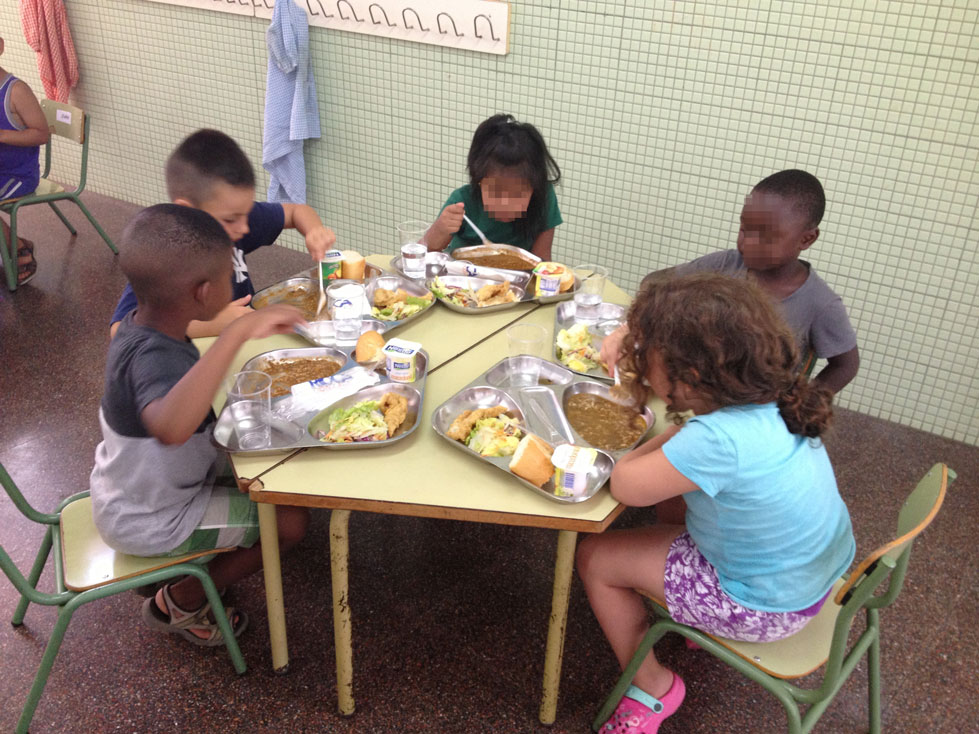¿Se vulneran los mismos derechos de los niños en países ricos y pobres?
¿Se vulneran los mismos derechos de los niños en países ricos y pobres?
November 13, 2014
- Dos ejemplos, uno local y uno internacional, de programas transversales de integración y atención a la infancia
El próximo 20 de noviembre la Convención de los Derechos del Niño cumple su vigésimo quinto aniversario. Sin embargo, la pobreza y la exclusión en países ricos y en países en vías de desarrollo sigue siendo la causa principal de la violación de estos derechos.
En los países más pobres, la falta de acceso a las necesidades humanas más básicas (atención sanitaria, agua, alimentación y educación) y la falta de agua potable y saneamiento elevan las tasas de mortalidad infantil. Según fuentes de UNICEF, más de 1000 millones de niños en el mundo sufren graves carencias de estas necesidades básicas. Alrededor de 300 millones de niños van a la cama todos los días sin haber comido. De esta cifra, un 8% es víctima del hambre o de otras situaciones de emergencia y más de un 90% sufre desnutrición a largo plazo.
Para romper este ciclo, hay que satisfacer los derechos fundamentales de la infancia e implementar programas de intervención que garanticen la seguridad alimentaria y el desarrollo sostenible de las familias más vulnerables.
El programa de acceso a la salud y seguridad alimentaria que lleva a cabo el centro de atención a la infancia vulnerable, gestionado por la Association de Lutte contre la Vulnerabilité del Enfance Sénégalaise (ALVES), es un ejemplo. Esta ONG tiene el objetivo de luchar contra la pobreza y la exclusión social en Richard Toll, ciudad situada en Senegal en la frontera con Mauritania. Actualmente cuenta con unos 347 beneficiarios (67 niños de 3 a 6 años; 137 de 7 a 12 años y 143 de FP) que reciben apoyo integral en educación, nutrición, atención sanitaria, acceso al agua potable, informática, formación profesional y apoyo psicosocial. La ONG explica que desde 2010, algunas de las madres de los menores del centro han recibido clases de alfabetización, así como formación para gestionar huertos comunitarios y llevar a cabo pequeñas actividades comerciales que ayudan a mitigar la pobreza extrema en que viven. El proyecto, que cuenta con el apoyo de la Fundación Probitas, contribuye en primer lugar a mejorar la situación nutricional de los beneficiarios y el acceso a la atención sanitaria. Y, en segundo lugar, ofrece apoyo educativo, seguimiento psicosocial y promueve la puesta en marcha de actividades generadoras de ingresos para favorecer la autonomía económica de estas familias.
En los países más desarrollados la crisis ha intensificado la desprotección y la exclusión de menores debido a la disminución del margen de acción de las políticas sociales y la distribución de ingresos.
Por ello, existen modelos locales de red territorial que desarrollan proyectos en un marco transversal e integral para combatir estas carencias de la administración. El Consorcio Badalona Sur es un proyecto consolidado en este territorio que pone sus programas, actuaciones y recursos disponibles al servicio de las personas para ofrecer respuestas a las complejas necesidades y demandas sociales agravadas por la crisis.
Núria Sabater es técnica de proyectos y una de las trabajadoras sociales del Consorcio. Explica que el programa ha potenciado la relación y cooperación con las diversas comunidades presentes en el territorio en los ámbitos de resolución de conflictos, lucha contra el absentismo y mejora de los hábitos saludables. Esta cooperación se extiende a las diversas instituciones y entidades presentes en el territorio "para incrementar su confianza", dice Sabater. En el caso del programa de Hábitos Saludables, "la colaboración de la Fundación Probitas es fundamental".
En 2013 Probitas impulsa el proyecto propio RAI-Hábitos Saludables en Badalona Sur con el objetivo de que los menores puedan alcanzar un desarrollo adecuado, tanto personal como social, mediante la práctica del deporte y la mejora de los hábitos alimentarios. Entre otras actividades, explica Sabater, se ha puesto en marcha un huerto comunitario para potenciar la labor pedagógica mediante el cultivo y mantenimiento del huerto. El programa también promueve la actividad física a través de actividades extraescolares. Sabater señala que la crisis está afectando la salud mental de los niños: "Hay familias que no llevan el hijo al psicólogo", dice. Por ello, el consorcio ha creado el proyecto 'psicólogos desde la escuela' con el objetivo de garantizar desde las escuelas un control continuado de la evolución de los niños. "Probitas también nos ayuda con esta acción [a través del proyecto propio RAI-Cuída'm] y financia el tratamiento en San Juan de Dios de los niños que necesitan algún tipo de atención psiquiátrica o psicológica", explica la misma técnica.
Todos los agentes implicados en el Consorcio trabajan de una manera transversal. De esta manera se puede hacer un seguimiento del contexto del menor desde una perspectiva global.
Por ejemplo, el servicio orientado a la promoción y al apoyo de la escolarización del Consorcio, acordado con todos los agentes educativos del territorio, ha generado un circuito común de trabajo en el que se integran todas las actuaciones dirigidas al tratamiento del absentismo y la desafección escolar. "No sólo trabajamos un aspecto concreto del niño. Vinculamos las acciones educativas con la promoción de hábitos saludables y los servicios sociales. De esta manera minimizamos los efectos que se puedan dar en el menor ", remarca la técnica. "La exclusión se hereda de padres a hijos. Tenemos que romper esta herencia empoderando la gente que ha perdido capacidad para que tenga sus propios recursos", concluye.
Para ampliar información relacionada lee el siguiente artículo:
Derechos de los niños irrenunciables en un contexto de crisis

